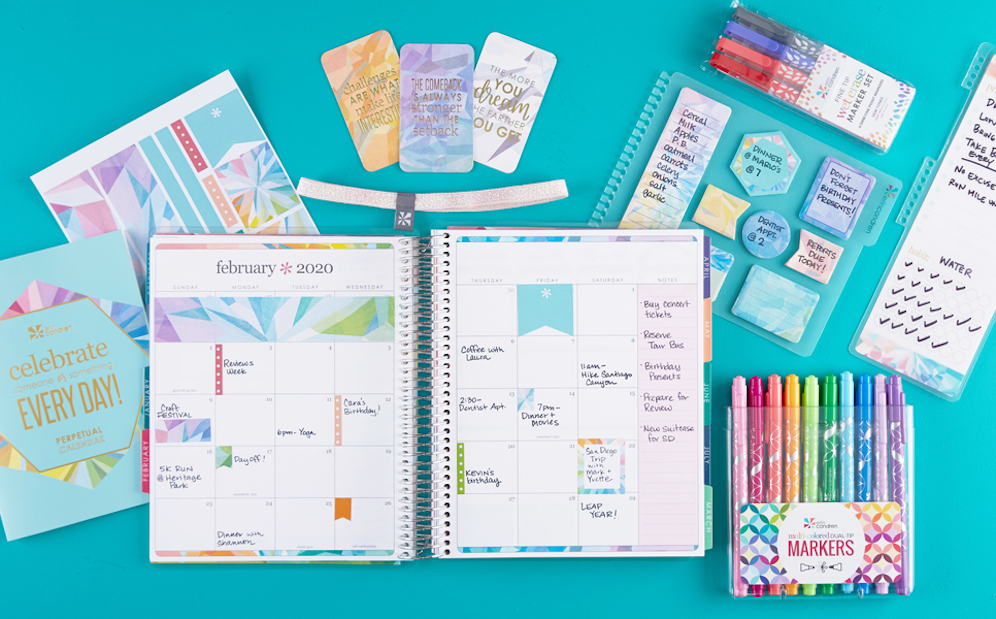You may not think the way you organize your desk or what you surround yourself with while at work has much of an impact on your productivity, but you’d be surprised. The way you organize your workspace can speak volumes about your behavior and have a direct impact on your working habits. I’m sharing my top productivity tips and organization hacks to show you how to maximize productivity at work with a little more style & a little less stress!
Firstly, it’s important to design a creative space that speaks to your aesthetic! Whether you’re a neutral gal all the way or can’t get enough of color, surround yourself with what inspires you! From motivational quotes to bright hues, your fave pen and writing tools, stylish stickers, and more, setting yourself up for success truly starts with your desk décor! (Is anyone surprised my desk is turquoise?)
Your desk should be organized to encourage goal-setting, creativity and productivity! Small changes like setting your screensaver to an inspirational quote or adding a pop of color with pretty planners and notebooks can go a long way in exciting and inspiring you to be your most creative self.
To make sure you’re staying focused on how to truly increase productivity, I’ve put together my top tips:
1. Plan for tomorrow, but make the most of today.
An easy way to lose track of time is by living in the future at the expense of the present. Set aside time to plan ahead, then put aside planning and live out your plans in the moment. I like to make my to-do lists for the next day at the end of the night. It’s a good way to wrap up the workday, and this way I can review what I accomplished in that time period and what I need to allocate more time towards in the upcoming week.
2. Use a LifePlanner™.

I first developed the LifePlanner™ to not only be a space for managing your schedule—though it does do that—but a stylish space for goal-setting, organization & increased time-management. And it seems to be working; 93% of LifePlanner™ customers agree that it increased their productivity. The LifePlanner™ truly is the most powerful tool that I rely on to manage my time and stay organized!
3. Know when to say “no.”
Overcommitting yourself to time-consuming tasks is a sure way to lose control of your time. Know what’s on your plate and when it’s full. You have to say “no” every once in a while to keep your priorities straight and stay productive. This is why it’s crucial that your to-do list includes several “must-dos” and several “would like to’s.” Being able to remain flexible and nimble at work is the key to success, and knowing when to say “no” so you can prioritize those “must-dos” is important! I’ve overbooked myself more times than I can count. Once I was finally able to identify what was within the scope of what needed my direct attention, I was so much more productive.
4. Eliminate distractions.

If you’re working against a deadline, now is not the time to allow yourself to get distracted. The obvious answer is to avoid browsing online, catching up on the top news headlines or checking in on social media, but the less obvious trap many of us fall into is becoming sidetracked by incoming emails and notifications! Set aside time to catch up and respond to notifications, but turn them off when you want to focus and achieve optimal productivity. Likewise, don’t leave obvious distractors out on your desk! I personally love using a Designer Hourglass to help me take mindful breaks throughout the day.
5. Give yourself a time buffer.
Set self-imposed deadlines ahead of actual deadlines. If you know something is due at 9:00 am on Tuesday, give yourself a due date of the Friday before, so if your Monday gets slammed, you won’t find yourself in a frenzied race against the clock. (While this is not always possible, it’s incredibly helpful!)
6. Plan gaps in your schedule.
Things don’t always go as planned. But a counterintuitive productivity hack is to plan gaps in your daily schedule to make room for whatever unplanned events may pop up. Or, when things do go smoothly, you can use those schedule gaps to review and recharge. Even if it’s just 30 minutes at lunch (and some days, I don’t even have that!), knowing you have a small space carved out can be critical!
7. Know when to take control and know when to delegate.
We all have moments where we want to control everything (guilty as charged!), but eliminating the non-essential and delegating when necessary is working smarter, not harder. It also gives other team members a chance to pitch in on something that can ultimately help everyone out! I struggled with this step for a long time, hating the idea of not approving every tiny detail myself. By delegating, I’ve been able to truly grow my “dream team” and have been able to let others take over projects so I can focus on my top priorities.


